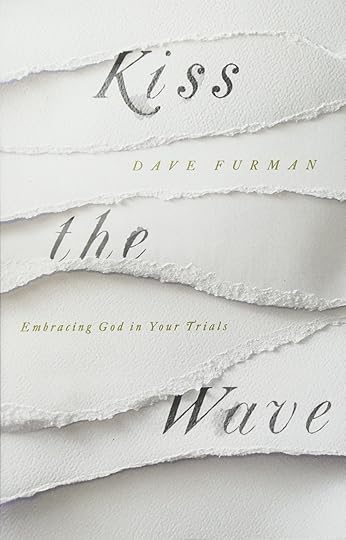Randy Alcorn's Blog, page 104
April 1, 2019
Much-Needed Perspectives on Suffering from Dave Furman

 I really appreciated this 20-minute interview about chronic pain with Dave Furman, a church planting pastor/missionary in Dubai and the author of Kiss the Wave: Embracing God in Your Trials. I met Dave at a Gospel Coalition conference I was speaking at a few years ago, but at the time had no clue about his chronic pain.
I really appreciated this 20-minute interview about chronic pain with Dave Furman, a church planting pastor/missionary in Dubai and the author of Kiss the Wave: Embracing God in Your Trials. I met Dave at a Gospel Coalition conference I was speaking at a few years ago, but at the time had no clue about his chronic pain.
What he shares in this podcast was very touching to me, and perhaps it could encourage you as you face your own suffering, and be a resource to share with others to help bring them to greater understanding. Dave’s perspective is such a much-needed one.
Since we’re on the subject of suffering, let me again highly recommend the Beyond Suffering Bible, which includes devotionals on the subject of suffering, words from Joni Eareckson Tada, study notes, intros, and topical guides.
Also, here’s an article on how Your Suffering Can Be the Pathway to Greater Godliness, which I wrote a few months ago during my wife Nanci’s cancer treatments.
“I know, O LORD, that your rules are righteous, and that in faithfulness you have afflicted me” (Psalm 119:75).
For more related to the subject of suffering, see Randy’s book If God Is Good, as well as the devotional 90 Days of God’s Goodness and book The Goodness of God. Also, the booklet If God Is Good, Why Do We Hurt? deals with the question and shares the gospel so that both unbelievers and believers can benefit.
Photo by Jeremy Bishop on Unsplash
March 29, 2019
What About Quoting from Someone You Disagree with in Some Areas or Who Had Personal Moral Failures?

Over the years, I’ve been asked why I would quote from someone in my books or on Facebook or Twitter when I don’t agree with them in every area. My response is that when I quote someone in a context of agreement, the only thing I’m saying is I agree with that statement, not all their other statements. Nor is my quoting someone a blanket endorsement of their lifestyle and choices in every area. Otherwise there is no one I or anyone could quote from!
For example, there are any number of areas in which I disagree with C. S. Lewis, but the quotes from him I put in my books are very insightful observations which I do agree with. Another example is Martin Luther, whom I respect and quote from even though he was anti-Semitic, and I deeply disagree with his view of Jewish people.
To be influenced by someone does not require that we endorse that person in all areas. That said, there is also much inaccurate criticism of people on the internet. For instance, I’ve been sent things that claim C. S. Lewis was a universalist. That’s simply false. A universalist believes everyone will be saved and go to Heaven. But Lewis emphatically believed some people would go to hell for eternity, not Heaven, and he said so clearly. (In this article, I talk more extensively about Lewis’s writings on hell, which include many profound and fascinating things. Some are biblically precise, while others are more abstract and subject to misunderstanding. In some cases, his views are not solidly biblical. But many of his insights on hell are true to Scripture, and some of his speculations are compelling food for thought.)
John Piper has addressed the question of “How I Process the Moral Failures of My Historical Heroes?” in the following video. I found this helpful, and hope you do too:
Photo by Caleb Woods on Unsplash
March 27, 2019
One Woman’s Insights on Church, Women, Authority, and Creating a Culture of Happy Complementarians

Today’s blog features an article by Whitney Woollard titled, “Delighting in Authority: How to Create a Culture of Happy Complementarians.” My daughter Angela passed it on to me, and it’s terrific.
Women in church leadership is a huge issue and there are related biblical issues at stake. (If you’re interested, I share some more thoughts here.) The widespread perception among both unbelievers and believers in our culture is that conservative Bible-believing churches—especially those that are also politically conservative—are the last bastion of cultural chauvinism, dedicated to stereotyping, subjecting, and minimizing the equality, worth, intelligence, and gifting of women. We are thought to foster disrespect and, indirectly, abuse.
Unless we intentionally show this isn’t true—and demonstrate an authentic (not merely superficial) respect for women as intelligent and gifted students and teachers of God’s Word—many of our girls and young women will drift away from the church, or turn to churches that are egalitarian. Others may stay but never discover and use their gifts. Furthermore, there’s a large segment of culture we won’t reach.
We shouldn’t ever violate what Scripture commands in an attempt to be relevant, but we should exercise the freedom to do what Scripture allows to grant women the widest and deepest and most meaningful roles in Christ’s body.
That’s why we need to hear from voices like Whitney’s. She’s a writer, speaker, and women’s Bible teacher here in Portland, Oregon. You can learn more at whitneywoollard.com. —Randy Alcorn
Delighting in Authority: How to Create a Culture of Happy Complementarians
By Whitney Woollard
If I were a man, I would be a church planter.
I’m a strong leader with the gifts and wiring essential to the call. I thrive when casting vision, making disciples, training leaders, preaching the Word, and evangelizing the lost. I’ve been “thinking in sermons” since I was fifteen. I can’t help but target potential leaders. I constantly wonder how to reach my community. It’s instinctive. When I hear a powerful sermon, I feel a compulsion to preach. When someone leaves the church, I can’t sleep at night. When I study a text, I obsess over theological clarity.
But I’m a woman—a woman who believes God has spoken authoritatively in his Word on all matters pertaining to life and godliness. A woman whose conscience is bound by the conviction that the authoritative teaching office of God’s covenant community is reserved for men. I’ll never plant a church as the lead pastor/elder [1] not because I’m incompetent or lack the desire but because I believe the Word speaks with authority on this issue, and I trust the God who authored it. In fact, I delight in the authority of the Word, my husband, and the local church. I’m convinced everything God ordains, including various spheres of authority, is the best possible plan for his glory and my good. I’m what you would call a happy complementarian. [2]
“Coming Out” as a Happy Complementarian
Unfortunately, not everyone delights in God-ordained authority. On the one hand, pop-culture has done a fine job of convincing women that femininity and freedom can only be found in throwing off the patriarchal shackles of previous generations to discover our “true, empowered selves.” I’m told my feelings and desires are the ultimate source of authority. Even an unbeliever would encourage me to plant a church if that meant “following my heart.” Today in Portland, Oregon—where I live—to be a strong woman is to reject any limitations on what I can or should do.
On the other hand, some Christian sub-cultures (particularly strands of fundamentalism that uphold a view of complementarianism suspiciously close to subordination) have created miserable women who outwardly affirm complementarian convictions while inwardly despising authority. Some have tragically suffered spiritual abuse from leaders and no longer know how to distinguish godly authority from an ungodly authoritarian. Others feel so trapped by manmade traditions and superficial limitations that they become like caged animals provoked even by innocent bystanders. They’re the bristly ones who affirm male headship but are bitterly offended at the slightest talk of authority.
I want to reject both extremes, even if it invites disapproval. I’m tired of apologizing for being a strong female and a conservative complementarian. In one circle, I’m too educated, too theological, too opinionated, and ask too many questions. In another circle, I’m too conservative, too prudish, too restricted, and don’t speak enough.
It’s time for the church to create space in its local assemblies for strong females who happily affirm authority (e.g., male headship and eldership) while advocating for more opportunities for women to flourish according to their gifts and qualification. Imagine how the gospel could be displayed to the watching world if churches were filled with biblically-minded women who embraced God-ordained authority as a blessing rather than a burden? This counter-cultural impulse would offer continual opportunities to share the gospel with a world that’s desperate for truth.
How Can Pastors Help Female Leaders Delight in Authority?
But how can you do this when the overwhelming voice of culture smacks of anti-authority sentiments? The ideas below are neither novel nor exhaustive, but they do come from someone whose entire life is and has been directly affected by her views on authority.
1. Cultivate a High View of God’s Word.
Any discussion on authority must begin and end with the Bible. To start anywhere else is to build your “theological house” on the sand. Too often, people will start with a John Piper sermon or a CBMW article without pushing women to grapple with the biblical texts themselves. But only the Word of God has the power to penetrate to our innermost being and shed light on areas we desperately try to hide—like our anti-authority predispositions.
It was a high view of God’s Word that brought me to my current convictions. Early in my Christian walk, I realized I had a dog in the “egalitarian versus complementarian” fight. I applied myself to the Scriptures, earnestly desiring to know what God said about leadership roles in the local church. I came to the conclusion that the authoritative teaching office of God’s covenant community throughout redemptive history has always been and should continue to be restricted to men (e.g., priests in the Old Testament, apostles during the Apostolic age, and elders in the New Covenant). And after coming to this conclusion, I felt joy! God gave me a clear conviction on this matter, and the issue has been settled ever since. My conscience is held captive to the Word of God. And to echo Luther, I believe to act against conscience is neither safe for me, nor open to me.
By constantly pointing to the Word, pastors can help women become the kind of people who are controlled by biblical conviction rather than personal preferences or pragmatism. Encourage them to search the Scriptures and see what God says about women in leadership. Discuss the central, debated texts and facilitate open dialogue. Create environments where women can ask questions as they wrestle with the issues. Help them think well about the Scriptures and be willing to graciously challenge any preconceived notions that may not be rooted in the Word. Ultimately, equip them to make informed decisions based on good exegesis that leads to God-glorifying convictions.
2. Cultivate a High View of Women.
From Genesis to Revelation, the testimony of Scripture is that both male and female are created beings invested with great dignity, value, and worth. And both are tasked with the awesome responsibility of making visible the invisible God through their work and service. The church should be the primary place where the glorious image of God is showcased through men and women carrying out the Great Commission together with mutual love and respect.
All too often, however, the church has devalued women by not providing provision for them to serve and flourish within their respective gifts. I see this regularly with women who have leadership and teaching ability. The church may have a strong position articulated on paper, but functionally they don’t know what to do with these women . . . so all too often they don’t do anything. This isn’t necessarily malicious or calculated; I think it’s just the state of affairs in conservative churches today—but it’s one in need of continual reformation. As a female gifted to lead, I can tell you it’s not helpful (in fact, it’s confusing) to form a theology of women in leadership that never gets implemented.
I have been in churches (large “progressive” churches) where my husband and I agreed with everything on paper, but I wasn’t actually allowed to do anything within my gift set. It turned out a young woman without kids could never teach women. This reveals a low view of women that’s too pervasive in many conservative complementarian churches. Women are an essential part of the body, gifted by the Spirit to serve the church, and they should be encouraged to minister in all the ways the Bible permits.
Part of good, God-ordained male leadership is creating environments in which women feel valued, protected, and encouraged to serve in the ways God has wired them. Show women you value them by forming a robust, biblical theology of women in leadership and then actually implementing it. Here are a few suggestions:
Provide opportunities for aspiring female teachers to get proper training so they can teach and preach the Scriptures to other women well. Perhaps consider one of these Simeon Trust workshops for women.
Offer seminary-like classes on basic Bible, theology, and spiritual formation for your women.
Give the women’s Bible study team time each semester to go over the curriculum and help them teach it well.
Invite feedback from women on your sermons, on the worship, on the formation of small groups, and on the Sunday School classes.
Ask women how you could better serve them in the way you preach, pray, and lead. After all, on average half of your congregation are women so wouldn’t it be helpful to get insight into the spiritual needs of your women . . . from a woman?
Have women do things like serve communion, pray, read Scripture, or share their testimonies from the front. I cannot tell you how encouraging it is when I visit a church and hear a woman pray or read Scripture. It communicates volumes to the women sitting in your pews.
Periodically ask yourself, “Are the women in my congregation flourishing? Are they being provided various opportunities to serve? Are they being treated as co-heirs of eternal life and partners in ministry?”
Every one of these points comes from the practice of my local church, a conservative, Bible-teaching, gospel-centered, Baptist church. I recently told my pastor I would be complementarian wherever I go because my conscience is bound to biblical convictions, but he sure does make it easier for me to be a happy complementarian!
I’ve been a Christian for fifteen years, and this is one of the first churches where the lead pastor has made me feel like a blessing rather than a burden for being a theologically-minded woman. That’s fifteen years of struggling to find my place in the local church because I was made to feel like a burden for the way God wired me. I’m not entertaining self-pity here, but I do think that’s sad.
I believe many women would be more willing to graciously embrace male authority in the church if they felt valued by the male leadership and given opportunities to serve Jesus in meaningful ways. Pastors, I urge you to use your God-ordained authority to help female leaders to flourish in your church. Make authority a pleasant experience for them.
How Can Female Leaders Help Pastors Delight in Authority?
Part of being a “happy” complementarian is helping facilitate a culture in which male leaders find joy in leading us. We should (along with all believers) submit to authority in a way that helps leaders care for our souls “with joy and not groaning” (Heb. 13:17).
I’ll be the first to confess I haven’t always done this well. I can’t imagine how much “groaning” I’ve caused my pastors in the past. But, through much repentance and grace, I’m growing. Here are helpful suggestions I’ve learned along the way, primarily through my own sin and short-comings:
Give others a “category” for you. Oftentimes, people just aren’t sure what to do with strong, theologically-minded women. Graciously help them see that you’re a woman who loves Jesus, delights in male authority, and desires to teach the Bible to other women.
Speak highly of the male leadership in your church and home (if married). One of the most harmful things a woman can do is publicly criticize her pastor or husband. If we truly delight in male headship, our words should reflect it.
Look for ways to encourage your pastors and elders. For example, tell them when a sermon was especially helpful or mention specific ways you’re praying for them.
Thank your leadership for the current opportunities women are given to serve the church. Let them know it doesn’t go unnoticed.
Be quick to communicate and slow to assume. Communicate that you have a passion for teaching women the Bible rather than assuming leadership knows and is intentionally withholding the role from you. A lot of hurt feelings are built upon false assumptions.
Ask if there is or will ever be provision to serve within your gifts. Display a willingness to be trained and equipped accordingly. Show your pastor(s) that you’re also willing to serve outside of your gifts in order to help the church.
Ladies, let’s make authority a pleasant experience for the men in leadership over us by being a blessing to the body. May our words, actions, and attitudes help them view their God-ordained role as a delight.
Finding Freedom within Limitations
The Psalmist declares, “I run in the path of your commands for you have set my heart free” (Ps. 119:32).
This reflects my heart on the issue of authority. Years ago, I bowed before God’s infinite wisdom on the matter of women in leadership and discovered the path beneath my feet was broadened. There’s a delightful freedom to be experienced when one accepts God-given boundaries. My conscience is clear, my convictions are firm, and my ministry is meaningful.
I’m not sad that I’m not and couldn’t be a church planter or lead pastor. I don’t feel restricted or resentful. Instead, I feel full. Submitting to the authority of God’s Word, specifically as it plays out in the local church, has freed me to run in the path of God’s commands. I have found great freedom within authority.
What about you?
Footnotes
[1] This truth doesn’t mean women cannot be involved in church plants. Of course they can. They should be! A well-rounded planting team would include trained, equipped women in the core group. I’m speaking to the lead, authoritative role as the church planter.
[2] A complementarian holds the theological view that men and women are created equal in dignity, value, and worth but hold differing, complimentary roles in marriage, family, and the local church.
This article was originally posted on 9Marks and is reposted by permission of the author.
Photo by Ben White on Christianpics.co
March 25, 2019
“Keep Your Heart,” “Expensive Principle,” and More Odd Google Translate Renderings of My Book Titles from Other Languages

One of my great joys is to see my books translated into languages around the world. To date, there have been translations in over seventy languages (see the full list).
 It’s always interesting to see the different covers that the publishers choose, some of which are wildly different—and also sometimes better—than the original English version. Years ago I blogged about some of these covers, including the Korean Heaven for Kids, which portrays me, as the author, as an old man with a cane speaking to children. The Indonesian translation of the same book has green children on the cover.
It’s always interesting to see the different covers that the publishers choose, some of which are wildly different—and also sometimes better—than the original English version. Years ago I blogged about some of these covers, including the Korean Heaven for Kids, which portrays me, as the author, as an old man with a cane speaking to children. The Indonesian translation of the same book has green children on the cover.
I’m also fascinated by the titles the translators choose, wondering what exactly they mean to those who will read them. Out of curiosity, I had a couple of our EPM staff try plugging some of them into Google Translate to see what they came back as in English. Some titles are insightful, while others are downright humorous. Of course, Google Translate is a great program that can be helpful, but it can only translate words literally; it can’t convey the meaning of distinctive cultural idioms.
 The Purity Principle, translated into about twenty languages, gets some interesting results. The Turkish title translates back into English as Sexual Minority Theory; the Czech as The Principle of Cleanliness; the German as Keep Your Heart. The Indonesian title came back as the unfortunate What’s Wrong with Sex? (Of course, there’s nothing inherently wrong with it! God created and designed sex for the sacred union of marriage, and reserves it for that union. When it takes place in its proper context, God is definitely pro-sex.)
The Purity Principle, translated into about twenty languages, gets some interesting results. The Turkish title translates back into English as Sexual Minority Theory; the Czech as The Principle of Cleanliness; the German as Keep Your Heart. The Indonesian title came back as the unfortunate What’s Wrong with Sex? (Of course, there’s nothing inherently wrong with it! God created and designed sex for the sacred union of marriage, and reserves it for that union. When it takes place in its proper context, God is definitely pro-sex.)
 My book Why ProLife? also had some interesting translations. The Serbian title is fitting: Abortion: Right to Choice or Murder? So is the Turkish title: Do You Have a Right to Life? The translation of the Faroese (a North Germanic language with about 66,000 first-language speakers) title is Who Protects Lives?; the Estonian unfortunately came across as Why The Egg Is for Life. (Prolifers are sometimes asked, “Then why isn’t it murder to destroy a sperm or an egg?” The answer, as every scientist should know, is that there is a vast and fundamental difference between sperm and unfertilized eggs on the one hand, and fertilized eggs, or brand new unborn children, on the other. Of course, I have no idea what an Estonian reading the title in his own language would think—it might be a far better title than Google Translate makes it seem to us!)
My book Why ProLife? also had some interesting translations. The Serbian title is fitting: Abortion: Right to Choice or Murder? So is the Turkish title: Do You Have a Right to Life? The translation of the Faroese (a North Germanic language with about 66,000 first-language speakers) title is Who Protects Lives?; the Estonian unfortunately came across as Why The Egg Is for Life. (Prolifers are sometimes asked, “Then why isn’t it murder to destroy a sperm or an egg?” The answer, as every scientist should know, is that there is a vast and fundamental difference between sperm and unfertilized eggs on the one hand, and fertilized eggs, or brand new unborn children, on the other. Of course, I have no idea what an Estonian reading the title in his own language would think—it might be a far better title than Google Translate makes it seem to us!)
The Treasure Principle has sold over two million copies in English and has been translated into thirty languages. The Danish title translated as Save Up in the Sky; the German as Where Your Sweetheart Is; the Latvian as Thorny Principle (another translator said Expensive Principle!).
One of my favorites is the Italian title for my novel Lord Foulgrin’s Letters, inspired by C. S. Lewis’s Screwtape Letters. Google Translate renders it The Letters of the Count Grin of Putrid.
 The French title for my small book TouchPoints: Heaven came across as Feet on the Ground, Eyes to the Sky. (Sort of an abridged version of what I’ve written about how it’s possible to be both heavenly minded and of earthly good!) I also like how the Dutch title of The Goodness of God translated as A Good God in Evil Days; or there’s the Korean title for my book Heaven, which in English is Heaven Is Like This.
The French title for my small book TouchPoints: Heaven came across as Feet on the Ground, Eyes to the Sky. (Sort of an abridged version of what I’ve written about how it’s possible to be both heavenly minded and of earthly good!) I also like how the Dutch title of The Goodness of God translated as A Good God in Evil Days; or there’s the Korean title for my book Heaven, which in English is Heaven Is Like This.
What’s the point here? This is just a glimpse into the complex world of language and culture, and the fact that single words and especially word groupings are far more complex and idiomatic than dictionary definitions account for. And in every translation, there are always expressions, figures of speech, and illustrations which need to be altered, to make them culturally relevant and understandable. In fact, I’ve been contacted by a number of translators asking me if they can try to come up with their own illustrations when the English ones just don’t make sense in their culture. I always say “By all means!”
By the way, our ministry has translated lots of articles into other languages, including over 100 resources in Spanish, as well as some in French, Portuguese, Arabic, Chinese, and several other languages (see the full list here). If you know someone who speaks these languages, or ministers to others who do, we invite you to share them!
“And they sang a new song: You are worthy to take the scroll and to open its seals, because you were slaughtered, and you purchased people for God by your blood from every tribe and language and people and nation” (Revelation 5:9).
March 22, 2019
What Does It Mean That We're "Hidden with Christ in God"?

Colossians 3:1-4 tells us that as believers, in a sense, we’re already in Heaven with Christ: “Since, then, you have been raised with Christ, set your hearts on things above, where Christ is seated at the right hand of God. Set your minds on things above, not on earthly things. For you died, and your life is now hidden with Christ in God. When Christ, who is your life, appears, then you also will appear with him in glory” (emphasis added).
Our intimate link with Christ in His redemptive work makes us inseparable from Him, even now. As we walk with Him and commune with Him in this world, we experience a faint foretaste of Heaven’s delights and wonders.
Though it’s true that Christ is with us and within us while we’re on Earth, it also works in the other direction—we’re united with Christ, so much so that we are seated with Him in Heaven: “God raised us up with Christ and seated us with him in the heavenly realms in Christ Jesus” (Ephesians 2:6).
Notice that the following description, written to believers alive on Earth, is in the present perfect (not future) tense, which expresses a completed action: “You have come to Mount Zion, to the heavenly Jerusalem, the city of the living God. You have come to thousands upon thousands of angels in joyful assembly, to the church of the firstborn, whose names are written in heaven. You have come to God, the judge of all men, to the spirits of righteous men made perfect” (Hebrews 12:22-23).
In a metaphysical sense, we’ve already entered Heaven’s community. By seeing ourselves as part of the heavenly society, we can learn to rejoice now in what Heaven’s residents rejoice in. They rejoice in God, His glory, His grace, and His beauty. They rejoice in repentant sinners, the saints’ faithfulness and Christlikeness, and the beauty of God’s creation. They rejoice in the ultimate triumph of God’s Kingdom and the coming judgment of sin.
Heaven, then, isn’t only our future home. It’s our home already, waiting over the next hill. If we really grasp this truth, it will have a profound effect on our holiness. A man who sees himself seated with Christ in Heaven, in the very presence of a God to whom the angels cry out, “Holy, holy, holy,” won’t spend his evenings viewing Internet pornography.
No wonder the devil is so intent on keeping us from grasping our standing in Christ—for if we see ourselves in Heaven with Christ, we’ll be drawn to worship and serve Him here and now, creating ripples in Heaven’s waters that will extend outward for all eternity.
For more on the eternal life that awaits us, see Randy’s book Heaven. You can also browse additional resources on Heaven.
Photo by Christopher Sardegna on Unsplash
March 20, 2019
Am I Sinning If I’m Not Happy as a Christian?

Since writing my book Happiness, one of the questions I’ve been asked is, “Am I sinning if I’m not happy as a Christian?” In answering this question, I’m assuming two things of readers:
You are familiar with what I’ve written about how happiness and joy are synonyms, and how Scripture uses a number of related words to express gladness in God.
You understand the importance of walking in God’s revealed will in Scripture, and not seeking so-called “happiness” through sin and “whatever makes me feel good.”
God Commands We Find Our Joy in Him
The question is “Am I sinning if I’m not happy in Christ?” We need to understand that God doesn’t simply suggest that we find joy in Him; He commands it:
Finally, my brothers, rejoice in the Lord. (Philippians 3:1)
Whatever happens, my dear brothers and sisters, rejoice in the Lord. (NLT)
So now, my Christian brothers, be happy because you belong to Christ. (NLV)
Be glad in the Lord always! Again I say, be glad! (Philippians 4:4, CEB)
Delight yourselves in God, yes, find your joy in him at all times. (Phillips)
Does God mean it when He says “always”? Yes. The reasons for gladness in Christ are constant, like an ocean tide. The water doesn’t remain in the same place, always lapping over our feet. But even at low tide, it’s still there, poised to move in again.
Paul followed verse 4 with this encouragement: “The Lord is at hand,” which itself is a reason to rejoice. God is with us, never abandons us, and will deliver us soon, whether by death or by His return.
In light of such passages, I believe that a Christ-follower’s resignation to unhappiness is unbelief and disobedience. That may sound harsh, but I’m convinced it’s true, and actually hope-giving. (Since I’m not naturally chipper or bouncy, but more melancholic, this isn’t my personality speaking!) God wouldn’t command all His children to rejoice in Him always if only the naturally gleeful could obey.
A Measure of Obedience
Since God repeatedly commands His people to be happy, our happiness is a measure of our obedience. Don’t rush past that statement: our happiness is a measure of our obedience. Reread it. Ponder it. And consider that God in His grace would never command us to be happy without providing us the necessary resources to do so, including His indwelling presence.
I’m well aware that some readers of this blog may be experiencing deep suffering and sorrow, whether through the loss of a loved one, a debilitating disease, a difficult season of depression, or other painful life circumstances. My wife Nanci was diagnosed with colon cancer early last year, and went through several months of treatment and painful side effects. There were some very difficult days for her. So no, we won’t constantly be “bubbling over” with gleeful happiness every moment of every day. In a world under the curse of evil and suffering, something would be very wrong if we were!
But if we’re always focusing on life’s difficulties and trials, we won’t be happy people. Instead, if we focus on the Lord and His abundant grace, we will be happy. Paul said, “His glorious power will make you patient and strong enough to endure anything, and you will be truly happy” (Colossians 1:11, CEV).
Joy Through Hardship
Rejoicing always in the Lord seems unrealistic at times. But we must remember that this rejoicing is centered not in a passing circumstance but in a constant reality—Christ. Scripture doesn’t command us to rejoice in:
the condition of our nation
the direction our culture is headed
the attitude of a spouse
the struggles of our children
painful events at our church
the loss of a job
poor health
We’re to rejoice in the midst of these things, but of course they won’t be the source of our gladness. We’re told to rejoice in the Lord. Rejoicing in Christ is superior to all other delights, but it’s not always separate from them. Rejoicing in a friend, a parent, a child, a spouse, a job well done, or a glorious walk in the forest can in fact be choosing to find happiness in Christ.
The Bible never pretends that happiness is easy or constant. It’s unrealistic to expect perpetual happiness while the Curse is in effect. But the day is coming when “there will no longer be any curse” (Revelation 22:3, HCSB). Believing this can bring us great happiness even today.
When I am grieving over what God grieves over, I am not sinning. But if I am always grieving and always unhappy, if that is the normal state of my life over the long haul, then something is wrong. God wants something better for me. He really wants me to experience gladness in Him, instead of consenting to perpetual unhappiness.
I’m not always happy, any more than I’m always holy. I’ve experienced seasons of depression, both before and since coming to faith in Christ. This is partly due to my personality type and emotional makeup (and perhaps genetics), while some is triggered by my long-term physical illness (insulin-dependent diabetes), and some is the result of adverse circumstances. So I’m not a stranger to unhappiness—I really do get it!
But by God’s grace, I’m more supernaturally happy in Christ now than I’ve ever been. And as many other believers throughout history have, I’ve also learned to make choices that increase my joy. Great pain certainly dulls—and at times even overshadows—happiness, but it can’t destroy happiness that’s grounded in our ever-faithful God.
Sometimes sorrow and joy do battle; sometimes they coexist, but when our hearts and minds are on Christ, joy is never far away: “You changed my sorrow into dancing. You took away my clothes of sadness, and clothed me in happiness” (Psalm 30:11, NCV).
The Seriousness of Failing to Seek Happiness in God
So just how serious does God take His commands for us to rejoice in Him? Consider this statement: “God threatens terrible things if we will not be happy.” I’ll bet that got your attention. I never would have put it that way myself. Standing on its own, it sounds shocking, even outrageous! But Scripture supports it.
God’s Word Translation renders Deuteronomy 28:47, “You didn’t serve the Lord your God with a joyful and happy heart when you had so much.” Whether we find joy and happiness in God and His abundant gifts dramatically affects how He views our service for Him. He is not a master who cares only that His servants do what they’re told, but a Father who cares deeply about His children’s love for Him and the heartfelt emotional gladness we find in Him as we obey.
The obedience of dutiful drudgery is better, but only marginally so, than outright disobedience. Indeed, God sometimes disciplines His people who fail to find happiness in Him by sending unfavorable circumstances. Here’s the whole verse I quoted with the jaw-dropping one that follows: “Because you did not serve the Lord your God with joyfulness and gladness of heart, because of the abundance of all things, therefore you shall serve your enemies whom the Lord will send against you, in hunger and thirst, in nakedness, and lacking everything. And he will put a yoke of iron on your neck until he has destroyed you” (Deuteronomy 28:47-48).
This passage prompted British clergyman Jeremy Taylor (1613–1667) to write the striking words I used above: “God threatens terrible things if we will not be happy.” [1] Read this passage, and you’ll see that Taylor’s statement is true. If we refuse to serve the Creator and Redeemer of our souls in happiness, we will surely end up serving the enemy of our souls in unhappiness.
God’s severe mercy in bringing adversity when we don’t serve Him with joyfulness and gladness of heart may turn us to God, where we’ll find in Him the only heartfelt and lasting happiness available to us.
I am well aware that after reading such strong language some people will feel guilty. Some will say, “Okay, I’m already unhappy, so now you’re trying to make me feel guilty for being unhappy?” That is not my goal. My goal is to believe Scripture when it says that God who truly loves you, and Jesus who gave His life for you, has vested interests in you being happy in Him. He offers you the strength in the Holy Spirit to experience this happiness. Yes, there will be times of sorrow, but God can truly transform our default condition to one of happiness rather than sorrow.
Now, if your normal temperament lands you on a happiness scale of 2-3 out of 10, maybe the work of God’s Spirit won’t take you to a 10 but to a 6-7. But wouldn’t that be a greater miracle, then a naturally happy person (which again, I am not) becoming another 10% happier? So you don’t have to be the happiest person at the party to still enjoy God and find greater happiness in Him than you’ve ever known.
Remember, God’s commands are not to burden us, but to free us—the truth, including the truth about Him wanting us to be happy in Him—should set us free (John 8:32). Be encouraged, because everything God commands us to do He empowers to do, and He does it not only for His glory but for our good.
His Empowerment of Our Joy
The moment after death, all who know Jesus will experience a flood of happiness greater than we’ve ever known. We might ask ourselves in Heaven, if we are called upon to evaluate our lives here, Given Christ’s finished work on my behalf, with the indwelling Son and Holy Spirit, why didn’t I experience more of this happiness in God before I died?
The permanence of the Holy Spirit’s indwelling in our lives allows us to continually access a supernatural happiness even now. So we can “confidently approach the throne of grace to receive mercy and find grace whenever we need help” (Hebrews 4:16, NET). Our God of happiness has made the way for us to come before Him freely and draw deeply from His mercy, grace, and help at any and all times, including when we’re feeling drained of joy.
If the happiness in our walk with Christ is consistently gone, we’re wise to ask God and ourselves what needs to change. We should join David in praying, “Restore to me the joy of your salvation” (Psalm 51:12). This is a prayer God is always eager to answer.
[1] Jeremy Taylor, as quoted in C. S. Lewis, George MacDonald: An Anthology (New York: HarperCollins, 2001), xxxv.
Photo by Nathan Dumlao on Unsplash
March 18, 2019
To the Young Adult Diagnosed with Cancer

Stephanie Anderson is 32 years old, wife of Dan and the mother of two adorable and delightful daughters. (We raised two of them ourselves so I know them when I see them!)
Stephanie has worked for Eternal Perspective Ministries for over 12 years. Among other things, she manages my blog and Facebook and Twitter feeds, helps edit my books, assembles and designs our magazine and graphics, produces beautiful covers for some of my books, and responds very thoughtfully to questions we get on social media.
In addition to being a wholehearted follower of Jesus, Stephanie is one of the most creative, skilled, and wise people I know. Her thoughts about her experience with cancer will help young and old alike. Coming off Nanci’s and my “year of cancer” in 2018, I encourage everyone to read this article and pass it on to others! —Randy Alcorn
I vividly remember what it felt like to hear my doctor say, “Your x-ray shows a mass between your lungs.” Shock. Disbelief. Fear. Panic.
Somehow I held it together long enough to get through the rest of my appointment and drive home. But when I walked through my door, I collapsed, both physically and emotionally. What was going to happen to me? I was just 23, and a wife and the mom of a seven-month old baby. How could I possibly have cancer?
“Cancer” is a frightening word but just a theoretical one until it’s used in reference to you or someone you love. When it is, everything changes. The world shifts. Even those of us who’ve mentally acknowledged our mortality have a hard time accepting evidence of its existence. I never dreamed that my symptoms, no matter how severe, indicated I had Stage 2B Hodgkin's Lymphoma—after all, how many twenty-somethings did I know who had been diagnosed with something so serious?
Everyone’s cancer experience is different, but I wish there had been (or I had sought out) another young adult survivor who loved Jesus—someone to talk to who could have helped me through this process and told me what to expect. Recently I heard about a teenager just beginning treatments for Hodgkin’s Lymphoma, and it made me think about advice I might have to share with others. So looking back over the past nine years, here is what I would say to a young adult who’s been diagnosed with cancer:
Let others support and help you. Cancer treatments are hard and there will be times you aren’t feeling up to a lot physically, mentally, or emotionally. There will be days when you need to rest and not do a whole lot else. Be gracious with yourself, and don’t be afraid to share what you need with those who love you. It’s not weakness to do so. You can’t do this alone.
I’m so grateful that my husband and I had friends and family who understood what we needed even if I didn’t always. Friends brought us meals and offered childcare. Another anonymous friend dropped off a large bag of thoughtfully chosen gifts for me and our family on our front step. My mother in law watched our daughter during my chemotherapy treatments. Our church stepped in to help us with bills when treatments made it difficult for me to work and because my husband was in school. It wasn’t always easy to accept help and realize my physical limitations, but knowing that so many others cared about us and were willing to help made it easier to say “yes” to their offers and to rest when I needed to.
Take advantage of good resources, and possibly even professional counseling, to help your heart and mind. When you’re undergoing such trauma, it’s hard to think straight through the stress and anxiety—not to mention the treatment side effects. Your body is receiving medicine to fight the cancer, but your mind and spirit require daily medicine, too, to fight the cancer of fear and unbelief.
We all need a healthy dose of truth each day. Our best and most important resource is God’s Word. We need to dig deep into His Word and focus on God and His character. Nothing could be more important or perspective-giving.
There are also many excellent Christian resources specifically on suffering that can help you as you work through the “Why’s?” of your cancer. Though it was hard for me to read at the time, John Piper’s Don’t Waste Your Cancer is thought provoking and deep. I also read Randy Alcorn’s book If God Is Good? while I was undergoing chemotherapy, and it helped me solidify some important things about my suffering: God was good. He was with me. He was working all things together for my good. I could trust Him.
One thing I really wish I had done during or soon after my treatments was seek professional Christian counseling. When I was experiencing anxiety while waiting for test results after finishing my treatments, my oncologist explained to me that was to be expected. “It’s PTSD,” he said. “You’ve had bombs going off inside your body.” Before he explained it in those terms, I hadn’t connected my cancer experience with such trauma, but it made sense. It’s taken several years post-treatment and some wonderful counseling over the last two years to see how this experience, along with some other life experiences, have impacted me and how I can move forward and deal with my anxiety in more productive ways.
Stay away from searching the internet about your cancer. I remember spending hours online reading stories about other young adults who had been diagnosed with Hodgkin’s Lymphoma. When I read about survivors who were several years post-treatment and still cancer-free, I felt great hope. When I read about others who had relapsed and ultimately died, my anxiety raged.
I’ve heard doctors say, “Have you been staying away from Doctor Google?”, and there’s a good reason why. While there’s a place for healthy support groups, both online and in person, your mind is vulnerable during this time. Reading stories about others with your cancer and Googling every single symptom you’re experiencing can cause unnecessary stress. Not only is there much misinformation, but you’re also likely to misinterpret what you read. If you have concerns, talk directly to your doctor. Stay away from the internet!
Be honest with God, and others, about your fears and struggles. Don’t carry your burdens alone. I was able to share some of my journey through an online blog, and it was a great form of therapy and a good way to keep friends and family updated. But I still found it hard to speak honestly about my fears and worries with others, even my husband and close friends. I felt like if I acknowledged them, it made it more likely I would never get well and would die. In reality, this just made me feel more anxious. By sharing my fears, I wouldn’t have had to carry the burden by myself. My counselor recently told me, “You can’t fight anxiety alone.” I’ve found she’s right. We need others to pray for and intercede for us when we’re struggling.
It was also hard to be honest with God about my worries. Even though I knew that physical healing wasn’t dependent on my faith, it felt like giving voice to my fears was acknowledging that death was a real possibility. But in reality, God was and is intimately acquainted with me and already knew my struggles. He knows your struggles too, and you can be honest with Him.
Trust that God is using this—even this—in your life for your eternal good. When you’re in the middle of something so terrible, it’s hard to see how God could possibly bring good out of it. But that’s exactly what He promises about every single difficult thing we face in life: “And we know that for those who love God all things work together for good, for those who are called according to his purpose” (Romans 8:28). You may not see it at the time, but one day, even if not until eternity, you will.
I remember searching the Bible, wishing there was some assurance that I would get well and go into remission. Of course, there is no such promise. But there were, and are, plenty of promises that God would be with me and never forsake me, no matter what. This was solid ground for me to stand on when everything else was crumbling, and it will be for you too.
Yes, there are still some things that are really hard related to my cancer. Sometimes I’ll have a symptom that will remind me of that time and stir my anxiety. While I don’t need to worry about a relapse as much anymore, I have to be concerned about other types of cancer I’m more at risk for because of the chemotherapy and radiation. But mostly, I look back on my cancer experience and see God’s faithfulness. He was faithful to me during my diagnosis and treatments, and I can confidently say He will be faithful to you too.
March 15, 2019
Trustworthy with a Little, Entrusted with a Lot

Jesus says, “Whoever can be trusted with very little can also be trusted with much, and whoever is dishonest with very little will also be dishonest with much” (Luke 16:10). He implies that all of us are being continually tested in little things. If a child can’t be trusted to spend his father’s money and return the change, neither can he be trusted to stay overnight alone at a friend’s house. But if he can be trusted to clean his room and take out the garbage, he can be trusted with a dog or a bike.
This principle invalidates all of our “if onlys,” such as, “If only I made more money, I’d help the poor,” or, “If only I had a million dollars, then I’d give it to my church or missions.” If I’m dishonest or selfish in my use of a few dollars, I would be dishonest or selfish in my use of a million dollars. The issue is not what I would do with a million dollars if I had it, but what I am doing with the hundred thousand, ten thousand, one thousand, one hundred, or ten dollars I do have. If we are not being faithful with what he has entrusted to us, why should He trust us with any more?
This thought raises a sobering question: What opportunities are we currently missing because we’ve failed to use our money and our lives wisely in light of eternity?
God pays a great deal of attention to the “little things.” He numbers the hairs on our heads, cares for the lilies of the field, and is concerned with the fall of a single sparrow (Matthew 10:29). What we do with a little time, a little talent, and a little money tells God a lot. The little things are a major factor as he considers whether to commend and promote us—or reprimand and demote us—in His kingdom corporation.
Excerpted from Randy’s book Money, Possessions, and Eternity, which is also available on audio, read by Randy.
Photo by sallyjermain on Pixabay.com
March 13, 2019
Paul David Tripp on Our Eternity Amnesia

The Bible tells us we are pilgrims, strangers, aliens, ambassadors working far from home (Hebrews 11:13; 2 Corinthians 5:20). Our citizenship is in Heaven (Philippians 3:20). But we’ve become so attached to this world that we live for the wrong kingdom. We forget our true home, built for us by our bridegroom (John 14:1-2).
This makes us prone to spiritual amnesia, or as Paul David Tripp says in the excerpt below from his devotional New Morning Mercies, it makes us “eternity amnesiacs.” That’s why Charles Spurgeon gave this advice to his congregation: “Cultivate, then, your hope, dearly beloved. Make it to shine so plainly in you that your minister may hear of your hopefulness and joy, cause observers to take note of it because you speak of heaven and act as though you really expected to go there. Make the world know that you have a hope of heaven . . . that you are a believer in eternal glory and that you hope to be where Jesus is.”
May we clearly see our need to consciously live each day in light of eternity! —Randy Alcorn
You and I don’t always live what we say we believe. There is often a disconnect between our confessional theology and our street-level functional theology. There is often a separation between, on one hand, the doctrines we say we have embraced and, on the other hand, the choices we make and the anxieties that we feel. One of the places where this disconnect exists for many of us is the biblical teaching about eternity. We say we believe in the hereafter. We say that this moment in time is not all there is. We say that we are hardwired for forever. But often we live with the compulsion, anxiety, and drivenness of eternity amnesiacs. We get so focused on the opportunities, responsibilities, needs, and desires of the here and now that we lose sight of what is to come.
The fact is that you cannot make sense out of life unless you look at it from the vantage point of eternity. If all God’s grace gives us is a little better here and now, if it doesn’t finally fix all that sin had broken, then perhaps we have believed in vain: “If in Christ we have hope in this life only, we are of all people most to be pitied” (1 Cor. 15:19). There has to be more to God’s plan than this world of sin, sickness, sorrow, and death. There has to be more than the temporary pleasures of this physical world. Yes, there is more, and when you live like there’s more to come, you live in a radically different way.
When you forget eternity, you tend to lose sight of what’s important. When you lose sight of what’s truly important, you live for what is temporary, and your heart seeks for satisfaction where it cannot be found. Looking for satisfaction where it cannot be found leaves you spiritually empty and potentially hopeless. Meanwhile, you are dealing with all the difficulties of this fallen world with little hope that things will ever be different. Living as an eternity amnesiac just doesn’t work. It leaves you either hoping that now will be the paradise it will never be or hopeless that what is broken will ever be fixed. So it’s important to fix your eyes on what God has promised will surely come. Let the values of eternity be the values that shape your living today, and keep telling yourself that the difficulties of today will someday completely pass away. Belief in eternity can clarify your values and renew your hope. Pray that God, by his grace, will help you remember forever right here, right now. —Paul David Tripp
Browse more resources on the topic of Heaven, and see Randy’s related books, including Heaven, Eternal Perspectives, In Light of Eternity, the graphic novel Eternity, and the novel Edge of Eternity.
Photo by Ruud Luijten on Unsplash
March 11, 2019
Thoughts on Whether the Recent Reports on Sexual Abuse Are Attempts to Slander the Church, and 15 Consequences of Sexual Immorality

Recently I shared on my blog about The Houston Chronicle’s Report on Southern Baptist Sexual Abuse, and the Lessons for All Evangelical Churches. I want to respond to a couple of the comments I received about it.
One person wrote, “If I wanted to find dirt in any organization, I could; the press thrives on slandering the church.” Another commenter said, “So you have ask, how come all of a sudden now all these accusations. It seems like part of the Mueller investigation, anything to make Christians/conservatives look bad.”
Yes, there are certainly times when the world slanders the church and Christians by sharing reports that are not true or unjust. But the fact is, the sexual sin of SOME pastors in SOME churches is a reality (and sadly, it’s more than just a few pastors who are involved). This is at epidemic proportions, and epidemics are not solved by our saying, “This is just another attempt to make the church look bad.” (In the case of the Houston Chronicle report, the reporters reviewed thousands of pages of court, prison and police records, and built a database of leaders who have been convicted of sex crimes.)
We shouldn’t be quick to become the victim and not look at reality. Our goal shouldn’t be to convince the world (or ourselves) there’s no sin in the church. The world already knows there is, and so should we. And only if we do know will we do something to deal with and prevent it in Christ-honoring way. I’ve been encouraged to see some of the responses to the Houston Chronicle report so far, and hope and pray that all of this results in real changes and better protection for vulnerable people in our churches.
I’ve had other people tell me that it’s unbiblical to write about pastors and the dangers of sexual sin. But the Bible is full of warnings alerting people, including leaders, to dangers. God told Ezekiel to be a watchman on the wall and warn the people of sin and rebellion and its consequences. He warned Ezekiel if he didn’t speak up he would be accountable. Warning pastors and churches about sexual sin is like warning families to build strong marriages to resist the tide of adultery.
So the question is, shall we say nothing about what’s happening and just hope no one notices? And just hope churches and leaders figure out on their own that they need to cultivate a watchful accountable environment for their pastors and when pastors sin inform the next church? My question is, how has that been working for us?
Obviously it hasn’t been working at all! If people don’t speak up no one is warned and no one is helped and there is no hope of preventing sin, but only letting it grow in secret, multiplying itself in the darkness. God’s people are not to deny that sin is happening, but recognize it and seek to deal with it biblically and prevent it wherever possible.
Related to the subject of leaders and sexual sin, today’s blog includes an edited version of a list of anticipated consequences of immorality. My friend and fellow pastor Alan Hlavka and I wrote the original version over 35 years ago, when we were both pastors at Good Shepherd Community Church. Our individual lists were devastating, and to us they spoke more powerfully than any sermon or article on the subject.
Periodically, especially when travelling or when in a time of temptation or weakness, we each read through our own list. In a personal and tangible way, it brought home God’s inviolate law of choice and consequence. It cut through the fog of rationalization and filled our hearts with the healthy, motivating fear of God.
While God can forgive and bring beauty out of ashes, that’s a message to those who have already sinned...not to those who are contemplating sin! On the “front side” of sin we must not give assurances of forgiveness and restoration. We must put the focus where Scripture does—on the love of God and the fear of God, both of which should act in concert to motivate us to holy obedience.
I recommend that you use the following as the basis for your own list, and include consequences that would be uniquely yours. The idea, of course, is not to focus on sin, but on the consequences of sin, thereby encourage yourself to refocus on the Lord and take steps of wisdom and purity that can keep you from falling. (Of course, this list is not just for pastors and those in church leadership, but can be adapted by anyone.)
15 Consequences of Committing Sexual Immorality
I would grieve my Lord, and displease the One whose opinion most matters.
Christ’s sacred reputation would be dragged in the mud.
I would have to one day look Jesus in the face at the judgment seat and give an account of why I did it. I would suffer loss of reward and commendation from God.
I would force God to discipline me in various ways.
I would follow in the footsteps of men I know whose immorality forfeited their ministry.
I would cause the suffering of innocent people around me who would be affected by my decisions.
I would cause untold hurt to my wife, and lose her respect and trust—and likely my entire relationship to her.
I would cause hurt to my children and grandchildren, and lose credibility with them.
I would bring shame to my family.
I would bring shame to my church family, and to my fellow pastors and elders.
I would bring shame and hurt to my friends, and to those I’ve led to Christ and discipled.
I would experience great guilt, and be haunted by my sin when it is brought up wherever I go and whatever I do.
I would disqualify myself from ministry, and forfeit certain opportunities to serve God—maybe permanently.
I would enable the laughter, rejoicing and blasphemous smugness of those who disrespect God and the church.
I would bring great pleasure to Satan, the Enemy of God.
You can read the longer version of this list here.
Browse more resources on the topic of purity, and see Randy's book The Purity Principle and his booklet Sexual Temptation.
Photo by Jeremiah Higgins on Unsplash



